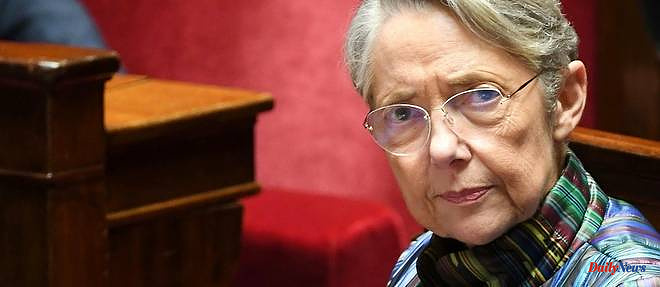The government assured Sunday that it did not want to use Article 49.3 of the Constitution, that is to say an adoption without a vote, to have the National Assembly approve its highly contested pension reform, and finds itself engaged in a hunt for the votes of the deputies who should decide on Thursday.
"We don't want 49.3. We want to transform our relative majority into an absolute majority," government spokesman Olivier Véran said on Sunday, after a meeting in Matignon with the head of government Elisabeth Borne and several ministers, including Bruno Le Maire (Economy), Olivier Dussopt (Labour) and Gabriel Attal (Public Accounts).
“We hope that there can be a positive vote for this text,” he added.
But "we will not give up on our reform," he said, suggesting that the use of 49.3 was not completely excluded.
This "is not our track today" even if this article appears "by definition in the Constitution", affirmed on France 2 Gabriel Attal.
Even if it does not use this constitutional tool, the government could as a precaution, in an ordinary or extraordinary Council of Ministers, take this week the legal provisions allowing it to be used, according to a government source.
The Prime Minister rose to the front line as soon as the vote of the Senate, dominated by the right, was acquired, late Saturday evening, by 195 votes against 112. She promised to now put all her "energy" so "that this text be voted on".
President Emmanuel Macron, for whom this reform pushing back the retirement age to 64 is politically capital, on the other hand remained on Sunday on his reserve and did not comment on the adoption of the text in the Senate.
“There is a majority in Parliament” to vote for the reform, wants to believe Elisabeth Borne, on the edge of a much tighter ballot which is announced in the Assembly.
The government has taken out its calculator and hopes to obtain enough votes from the party Les Républicains, however divided, in order to avoid the use of a tool perceived as authoritarian.
Olivier Dussopt and Gabriel Attal said to themselves, together on Sunday evening, "convinced of having a majority".
"We are building this majority, deputy by deputy", added Mr. Dussopt on BFMTV, while Gabriel Attal argued that "every vote less for the reform" would be "a vote for more taxes".
After three days of respite, parliamentary debates will resume on Wednesday, with the convening of a joint joint committee (CMP) in parallel with an eighth day of demonstrations against the reform.
In this meeting, seven deputies and seven senators will seek to agree on a compromise text. The government is not present there, but it can pull the strings.
If an agreement is reached, the text will go to the Senate again on Thursday for a final validation and then, probably in immense suspense, to the National Assembly.
According to a source within the executive, Matignon should bring together the parliamentarians of the majority concerned on Monday to prepare for the conclave, where the macronists and the right are in the majority.
Saying that there is a majority in Parliament is "the Coué method", said the leader of the socialist senators Patrick Kanner on RMC.
He pointed out that 50 votes had failed the right and the centrist group in the Senate to vote for the reform, "a significant alert", according to him.
Given the "unprecedented" level of protests against the reform, using 49.3 "would be a form of democratic vice", warned CFDT boss Laurent Berger.
The union leader warns above all against the "very deep resentment" that the adoption of the reform could arouse in the world of work, judging that Emmanuel Macron's refusal to receive the inter-union looks like an "incredible arm of honor to social democracy".
The government's update on Sunday also echoes the positions of several majority leaders.
The arguments against are "very strong", judged the Grand Jury RTL / Le Figaro / LCI the boss of the MoDem François Bayrou, even if "there are few margins" to bring together a majority of deputies.
The boss of the presidential Renaissance party, Stéphane Séjourné, is not in favor of 49.3 either and estimated in the JDD that the reform "can and must have a majority", calling "responsibly" the Republicans to vote for it.
But "if, in the end, there is a concern" the government "will have to use it", advised the boss of senators LR Bruno Retailleau at the Grand rendez-vous Europe 1 / Les Echos / CNews.
The executive puts all its hopes in Les Républicains, however particularly divided in the Assembly, where the slingers, including the deputy Aurélien Pradié, play the spoilsport.
Now "the LRs of the Senate must agree with the LRs of the Assembly", sums up a government source.
03/13/2023 08:14:50 - Paris (AFP) - © 2023 AFP












